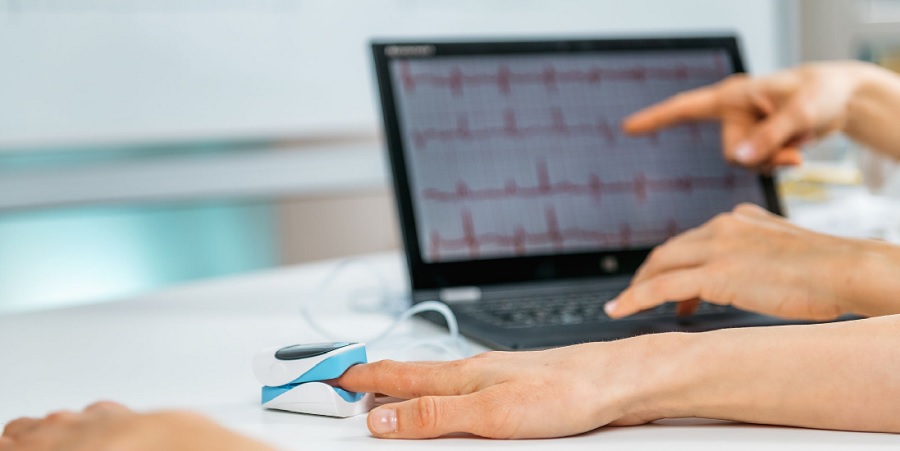
What is Biofeedback?
Biofeedback involves the use of highly specialized, highly sensitive, non-invasive technology that identifies your body’s physiological stress markers. Stress markers generally indicate inordinate stress, as well as resistance to or inability to recover from that inordinate stress. As long ago as 1994, over 70 medical conditions and diseases had already been definitively linked to chronic stress!
Many forms of Biofeedback have been around for a long time—some over a hundred years! Because of this long history, Biofeedback is evidence based. There is a substantial body of normative data to provide us with the parameters that identify a healthy or normal range versus a compromised state for these stress markers. A familiar example of a basic but important type of Biofeedback is a thermometer. Another is a blood pressure cuff. While these two measures are common health indicators, they can also be viewed as Biofeedback tools that flag physiological stress.
Our goal is to assess the feedback markers and then help you learn an effective skill set of techniques to mitigate your habitual or uninformed behaviors and cognitive responses to the detrimental stressfulness we experience- and to create a “life toolbox,” if you will.
What conditions does Biofeedback treat?
| Headaches – migraine, tension, vascular |
| Chronic pain; acute/post injury or post-operative, and resolving pain |
| Fibromyalgia |
| Hypertension |
| Diabetes |
| Anxiety/depression/ADHD/ADD |
| Chemical/alcohol/drug addiction and abuse |
| Addictive behavior disorders (smoking, eating, nail-biting, scab picking, etc.) |
| Gastro-intestinal disorders (IBS, ulcerative colitis, chronic constipation, etc.) |
| Insomnia and other sleep disorders |
| Panic/anxiety attacks and Post -Traumatic Stress Syndrome [PTSS] |
| Tachycardia and other cardiac conditions and arrhythmias |
| Arthritis and musculo-skeletal disorders |
| Cancer, auto-immune, and related conditions |
How does Biofeedback work?
Biofeedback gives particular focus to the classic or traditional markers/indicators of stress, to identify indicators of high or inordinate stress, also known as sympathetic overload, and also termed DIStress. Another term sometimes used for this condition is adrenal stress syndrome. The Biofeedback Specialist views and assesses these functions live and in real time—together with the patient during their sessions. The physiological functions are analyzed using specialized software and reporting screens. Commonly monitored functions are:
- BVP/HRV –blood volume pulse and heart rate variability
- TBK: Surface distal skin temperature
- RBK: Respiration rate, rhythm, mechanics and quality of respiration
- EMG: electromyography, also referred to as muscle tension
- EEG/NEUROFEEDBACK: electro-encephalography/brain waves
- GSR : Galvanic Skin Response or SC [Skin Conductance]; commonly referred to as sweating
The application of Biofeedback for patient management, improvement, and recovery employs numerous and carefully selected techniques and skills predicated on evidence- based practice. Patients learn breathing and other techniques used concurrently with biofeedback and view it in “real-time.” Thus a person can observe first hand and immediately how their skills and techniques are improving the identified stress markers. Patients tangibly experience the improvement and relief that these tools and techniques provide for them–often immediately, as they view live feedback and report screens.
When physiologic stress markers are identified via Biofeedback, we understand that a sympathetic overload could be present. The skills and techniques we teach focus on activating and engaging the parasympathetic nervous system to re-balance the sympathetic overload, thus re-regulating the autonomic system to recover from its overload.
The ultimate goal of Biofeedback is: AUTONOMIC SELF-REGULATION or RECOVERY to the body’s physiologically normal or ideal state of function. The skills and techniques learned provide life-long tools for maintaining recovery and building resilience, and effective self-management during the times of high stress we all experience.
Successful treatment is contingent upon patient participation through daily dedicated home practice and training, combined with subsequent and progressive treatment sessions. Average program length: 7-10 sessions. However, evidence supports significant improvement experienced even with a single session.
Can Biofeedback be used in conjunction with psychotherapy?
Of course! When used in the context of ongoing therapy, general Biofeedback will help you:
Recognize the unique sources/triggers of your reactivity, the things which make your symptoms bad
Recover from these triggers, and
Manage yourself in the face of events and situations that create stress in your life.
- You will develop the skills to drive ASR [Autonomic Self-Regulation], strengthen your HRV [heart rate variability,] and become independent in using them with high efficacy. We call this stress recovery.
- You will learn the process of creating and sustaining constructive change; rather than being pulled back to the anchors of old and/or detrimental behaviors and responses.
- You will begin building resilience to the stressors of life so that you can function better, more intentionally and with better health.
The outcome: you will feel and function better in your private, personal/family, professional and social life. Instead of being REactive, you can you use these skills to be PROactive in your life.
Instead of being the passenger in your life, you can become the pilot… Your Cognitive function will improve, and your counseling will be more effective because you will be more receptive to and successful with the process of change. Frequently, business or work performance and relationships improve as well.
How much will Biofeedback Services cost? Will my insurance cover it?
If you are already a patient receiving counseling at IPG or if you are being referred by a physician for assistance with treatment of a chronic, cardiovascular or neurological condition, then your biofeedback, stress and health management services at IPG can be submitted to your insurance carrier and might be reimbursed.
If your insurance does not cover the visits, or if you are a new patient strictly interested in experiencing Biofeedback, here are the fees for Biofeedback.
"Introduction to Biofeedback"
by Ellie Wolf, MS, BCB, Senior Fellow/BCIA

Ellie Wolf, MS, BCB, Senior Fellow/BCIA
Ellie Wolf, MS, BCB, Senior Fellow/BCIA, is a BCIA National Board certified Biofeedback practitioner, internship/mentoring supervisor, and certification course instructor. Specializing in Post-traumatic syndromes, anxiety and panic attacks, pain care and management, stress resilience, and stress recovery skills, Ellie has over 30 years’ experience in allied health care- including 20 years as board-certified in sports medicine/athletic training, and as an NATA National Certification Board Examiner. She served for many years in orthopedic and sports injury and physical therapy clinical treatment and management, incorporating biofeedback into the treatment protocol. Ellie has worked with professional, Olympic and collegiate athletes, including the first US Olympic Women’s Volleyball Team to earn the Silver Medal, as well as numerous professional athletes from all over the country. She also serves as an instructor for the STENS BCIA national certification course in Biofeedback.
This biofeedback healing process with Ellie Wolf was an incredible, life-altering experience. I moved from a painful, scary, anxious lifestyle to a peaceful, controlled, loving way of living. My family is so aware and happy to see me physically and mentally stronger. I can now control my stress [level], and consequently my pain.
I work in a fast-paced and stressful environment [the NFL.] The Biofeedback work with Ellie Wolf helped me to control my reaction to the stress and be more productive. And it has certainly helped me to enjoy the work so much more!

